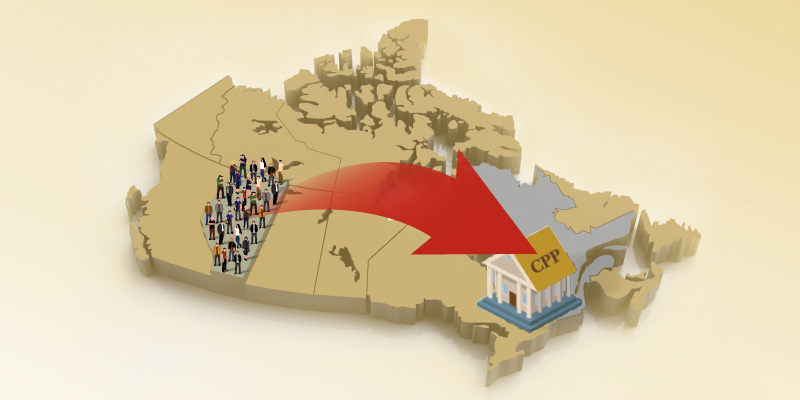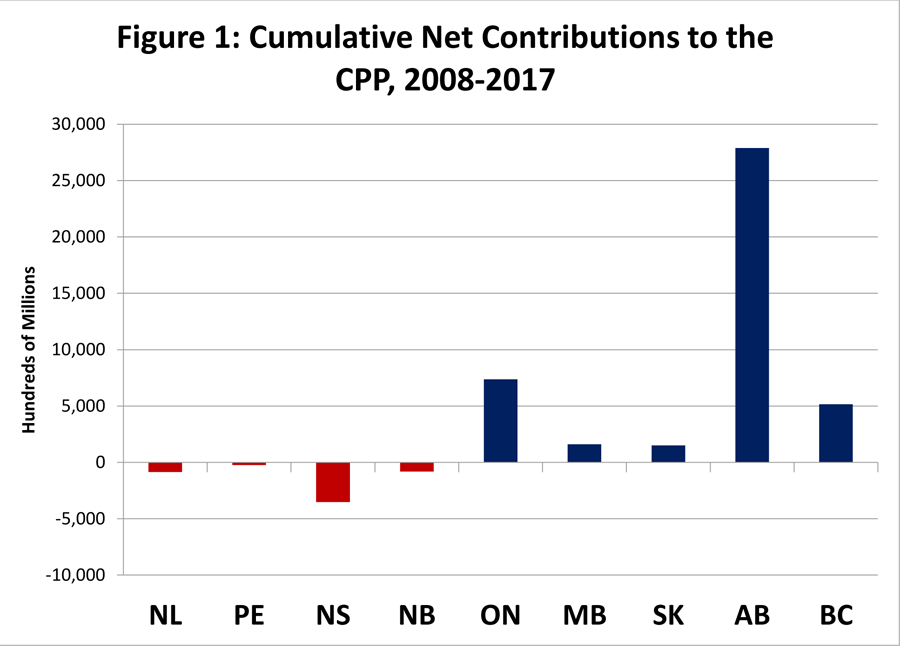IKnowNothing
Army.ca Veteran
- Reaction score
- 2,357
- Points
- 990
Agreed.There is not, at this point, a realistic chance it will see the light of day.

Agreed.There is not, at this point, a realistic chance it will see the light of day.
Yup, someone else explained that. But that cohort is long since passed at this point, and won’t affect any present day valuation or costing. The earliest recipients would also have been among the lesser contributors as well. So, an interesting quirk in the history of personal finance in Canada, but not really something to consider in context here.No, as in the first people to start drawing CPP got a really good deal.
Once the contribution rate jumped from 5% to 9% it became much less an awesome thing.Yup, someone else explained that. But that cohort is long since passed at this point, and won’t affect any present day valuation or costing. The earliest recipients would also have been among the lesser contributors as well. So, an interesting quirk in the history of personal finance in Canada, but not really something to consider in context here.


This doesn't mean anything without tracking net migration during and after employment. And if analysis revealed net out-migration from AB by retirees, it'd be necessary to bring health care costs into the discussion, since for most people the bulk of health care expenditures are required during the final years of life.From 2019, but very relevant in today's discussions regarding APP/CPP. This is why there is so much opposition to the APP.

Contributions to the CPP—comparing provinces
Alberta’s $27.9 billion net contribution over this period is almost four times greater than Ontario’s.fraserinstitute.org
We recently released an analysis of Albertans’ contributions to the Canada Pension Plan (CPP) over the last 10 years (2008-2017). The analysis compared the contributions paid by Alberta workers with spending by the CPP on retirees and other beneficiaries residing in Alberta. The study found that in the most recent year of analysis, 2017, Alberta workers contributed $2.9 billion more to the CPP than was spent on beneficiaries in the province. The cumulative 10-year number was $27.9 billion.
An important and interesting question not covered in the study was the comparison of Alberta to the other eight participating provinces. The chart below illustrates the provincial comparisons over the 10-year period of the study.

Alberta clearly contributes more than any other province despite its comparatively smaller population to Ontario and British Columbia. Specifically, Alberta’s $27.9 billion net contribution over this period is almost four times greater than Ontario’s and nearly 5.5 times greater than B.C.’s despite having a much smaller population.
As discussed in the study and another column, Alberta disproportionately contributes to the CPP and indeed other national programs because it has a younger population (fewer retirees), a higher employment rate (less unemployment payments) and higher incomes than the rest of Canada.
For example, in 2017, despite a weak economy, Alberta’s employment rate (66.7 per cent) was more than 5.0 percentage points higher than the rest of the country. Similarly, in 2016, Alberta’s average income was more than $7,400 higher than the national average.
As depicted in the chart, all the provinces except for the Atlantic provinces contributed (net) to the CPP over the time period. All four Atlantic provinces were net beneficiaries with Nova Scotia experiencing the largest inflow of expenditures (net) at $3.5 billion over the period.
The reforms introduced in 1996-97 to the CPP resulted in an accelerated increase in the already planned tax increases for the plan. Specifically, contribution rates were raised from 5.6 per cent to 9.9 per cent more quickly than previously planned. This meant the CPP would accumulate assets it could invest. The returns to the CPP from this accelerated increase in assets were a key part of the financial reforms that placed the CPP on solid financial ground.
This is an important consideration because despite the rate increase and designed net contributions to the CPP, the Atlantic provinces remain a net beneficiary of CPP spending. That is, even with the higher contribution rate, the mix of an older population, lower employment rates and lower average incomes in the Atlantic provinces mean they remain net recipients of CPP spending.
This acknowledgement reinforces the central insight of our study—that Albertans continue to make disproportionate contributions to a host of national programs including the CPP and that such programs would not be sustainable in their current form without Albertans’ contributions.
Not enough to matter, then. So all that's left is the usual bickering over what it means for people to be federal taxpayers.Figure 8?
Fraser Institute didn’t do it or Albert any favors by cherry picking a highly productive window within the 1965-now period. It also is a bit of an issue of credibility when it can’t even get details right, like the axis label on the chart…it’s actually ‘Millions’ not ‘Hundreds of Millions’ so it would be nice if their report graphics weren’t wrong by a factor of two Orders of Magnitude (10^2)…
I would like to see an actuarial full report on contributions by region and year starting from CPO and QPP inception, not a cherry-picked booming oil fields period.

Fraser Institute didn’t do it or Albert any favors by cherry picking a highly productive window within the 1965-now period. It also is a bit of an issue of credibility when it can’t even get details right, like the axis label on the chart…it’s actually ‘Millions’ not ‘Hundreds of Millions’ so it would be nice if their report graphics weren’t wrong by a factor of two Orders of Magnitude (10^2)…
I would like to see an actuarial full report on contributions by region and year starting from CPO and QPP inception, not a cherry-picked booming oil fields period.
Let the actuarial CPP numbers show that then.In it's defence that boom is not a blip it's 58 years... It's not like they just went 2001 to 2008.
We're closer to 2065 than 1965 now...

 angusreid.org
angusreid.org
Change is hard. So is educating the electorate. In my circles I've heard people say things like "The UCP wants to take our pensions!". This will be a tough up hill battle for a positive approval score.
CPP Showdown: Little desire for creation of new provincial pension plans across the country – including in Alberta - Alberta leaving CPP opposition
Survey shows Alberta leaving CPP opposition is strong — 48 % of Albertans oppose leaving CPP, while 36 % support it; many expect they’d lose in retirement.angusreid.org
Latest doesn’t seem to indicate an appetite for APP. This includes Alberta.
Especially when it involves politicians - of any stripe - and nobody believes anything any of them has to say anymore.Change is hard. So is educating the electorate. In my circles I've heard people say things like "The UCP wants to take our pensions!". This will be a tough up hill battle for a positive approval score.
Apparently the UCP is cancelling its planned in person town halls on the subject…

 lethbridgenewsnow.com
lethbridgenewsnow.com
Dinning had promised in-person town hall sessions in December but told reporters Friday those sessions will now be put off until Canada’s chief actuary gives its estimate of how much Alberta should receive from the CPP if it splits off.
Dinning said they heard from 142 callers and logged 3,800 comments and questions in the town halls to date, with about half the respondents urging Alberta leave the CPP alone and a quarter in favour of Alberta setting up its own plan.
That's one thing this province desperately needs - it's online government portal to be taken down and completely overhauled.I tried to find some stories about cancellation of "in person" town halls but the few links that seemed to be the closest in terms of specific language (all seemed to be local to Alberta/Western Canada outlets) had similar notices of "The page you requested was removed."
There was this from a piece published yesterday.

Alberta finance minister says he has not ‘flip-flopped’ on proposed pension change
EDMONTON, AB - Finance Minister Nate Horner - after promising any stand-alone Alberta pension plan would not f...lethbridgenewsnow.com
It doesn't surprise me that the telephone townhalls generated (in my opinion) a comparatively low turn-out. I tried to participate. I had gone on-line, they were aware of my interest; the day before the townhall for my area, I received a reminder message on my voicemail, confirming the time and some simple information needed to log in. The next day, at the appointed time, I called the number - no joy. I redialed a couple of times before getting an answer, but try as I might it didn't let me log in. So I went on-line to monitor the proceeding and to (if possible) submit a text question or comment: not possible. While the page did have directions (not very clear ones, to be honest) for submitting comment, neither the box to type text or the submit button worked. I was not impressed. My impression, much the same as my opinion of the original on-line government poll, was that the entire exercise was written to elicit a response that would be positive to the UCP's plan. When they don't get it, they keep changing the wording to finagle the result they want.
I'm pretty sure dinosaurs died in places other than Alberta...why are we always paying a disproportionate amount of the country's expenses as a whole?This acknowledgement reinforces the central insight of our study—that Albertans continue to make disproportionate contributions to a host of national programs including the CPP and that such programs would not be sustainable in their current form without Albertans’ contributions.

